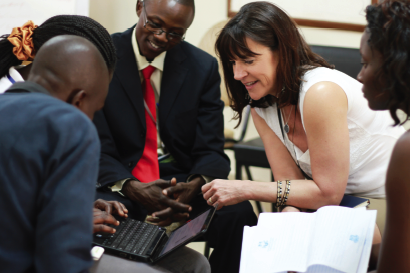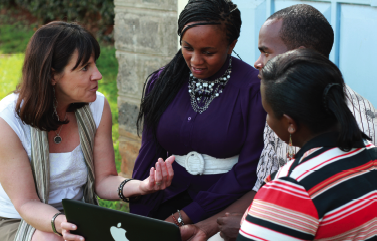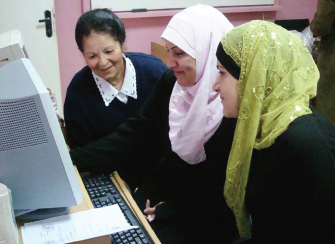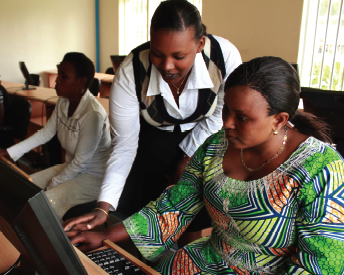Making Waves

A four-hour drive north of Kingston, Algonquin Park is a pristine wilderness, famous for lakes and forests that inspired the Group of Seven.
Janet Longmore, BCom’79, knows the park well. For two summers between her Commerce studies, she volunteered at Camp Outlook, a Queen’s-affiliated summer camp for at-risk local kids. After her first summer leading canoe trips in the park with crews of kids, she returned the next year as the Camp’s unpaid Director.
“Camp Outlook was a brilliant program,” Janet says. “I saw so many positive changes in a number of young people whose lives were enriched and whose confidence grew. It was a very influential experience that sparked my interest in helping youth achieve their potential, in spite of the obstacles they face.”
 Janet Longmore meets with DOT Interns in Nairobi, Kenya in May.When a lake is as smooth as glass, the dipping of a paddle creates a ripple effect that seems to go on to infinity. It is a fitting analogy to describe the trajectory of Janet’s career. Sometimes, from small ripples comes great change.
Janet Longmore meets with DOT Interns in Nairobi, Kenya in May.When a lake is as smooth as glass, the dipping of a paddle creates a ripple effect that seems to go on to infinity. It is a fitting analogy to describe the trajectory of Janet’s career. Sometimes, from small ripples comes great change.
Janet has been helping young people, in the various roles she’s held in the non-profit sector, ever since. In 2002, she founded Digital Opportunity Trust (DOT), an Ottawa-based organization with offices around the world. Since its inception, DOT has reached over 800,000 people in Africa, the Middle East and the Americas through its youth-led programs and network of over 4,000 young leaders of change. DOT Interns — local college and university graduates trained in technology and business — return to their communities to pass on their skills to locals struggling to make a better living for themselves and their families.
Starting Young
Janet’s philanthropic leanings began at an early age. She and her three brothers were taught to give back to their Sudbury, Ont., community by their father, a local doctor/GP, and mother, a phys-ed teacher. Janet volunteered at the local hospital and the Red Cross, and taught swimming and canoeing. After a visit to the Queen’s campus, where several friends were studying, her choice of university became clear. She loved the campus and Kingston’s small size. An entry scholarship to the Commerce program also helped tip the scales in Queen’s favour.
“Even at that young age,” Janet says, “I was very interested in figuring out how to study business and apply that knowledge to the non-profit sector.”
During her four years in Commerce, Janet juggled coursework and part-time waitressing with ComSoc and Alma Mater Society duties. Favourite courses included Professor Rick Jackson’s labour-relations and negotiations classes (including the infamous Bargaining Game), and an eclectic array of electives, from drama to astronomy.
To the surprise of no one who knew her well, Janet’s first job after graduation was an unusual one. She was Frontier College’s first female Labourer-Teacher, posted to an open-pit mining town in northern B.C., where she drove a giant truck capable of hauling 100 tons. She served as the union’s shop steward and volunteered her services after hours to teach life skills and tutor local children. When a new union tried to raid the members of Janet’s local, she was front and centre in the negotiations with the opposing union’s “big boys from Detroit.” Although only 24, Janet more than held her own. Those same negotiation skills served her well when she led women mine employees in launching a discrimination suit that they eventually won.
“I couldn’t have asked for better experience,” says Janet. “I was also respected in that community. It didn’t matter how young I was. In some ways, I was an example of the DOT model in action — the belief that young people can effect real change in their local communities.”
The 'Aha' Moment
True to her early ambitions, Janet turned her attention to the non-profit sector in earnest when, at 27, she became the Executive Director of a Toronto storefront operation for kids at risk. Five years later, she was heading up a national youth-leadership organization. Marriage to David Newing meant a move to England, where the couple started a family, welcoming son Greg in 1989 and daughter Suzanne in 1991.
When the family returned to Canada, Janet re-entered the workforce to establish the Canadian arm of a U.S. nonprofit organization dedicated to helping keep young people in school. Subsequently she was recruited to become the CEO of Communities In Schools, the largest U.S. agency for at-risk youth, based in the Washington, D.C., area. It was a big job, and a tough one, which involved extensive restructuring and forging relationships with the private sector. Challenging and fulfilling as the job was, the family yearned for a return to Canada. In 2000 they moved to Ottawa and Janet contemplated the next chapter of her life.
Her ‘aha’ moment occurred during a taxi ride in New York City, where she had been advising a U.N. organization on youth unemployment and the growing digital divide. “I was focused on the excess capacity and talent that under-employed and jobless youth represent throughout the world,” she recalls. The prevailing view expressed at the meeting she’d just left was that adults needed to be sent to the developing world to ‘help’ the locals.
“It hit me — my personal moment of inspiration; we had to turn the model upside down. We had to build the capacity of youth to lead change in their own countries, mould the role models in their own communities, embed the change-makers in their societies. We had to move away from the old model of importing the leaders of change. Eureka!”
DOT is Born
 Janet with Kenyan DOT Interns in May.On her return to Ottawa, Janet set to work, and Digital Opportunity Trust (DOT) was launched. Tapping into her extensive network of contacts, she lined up private-sector support. Cisco was a founding sponsor, providing a grant that would cover the first three years, thereby starting a relationship that continues to this day. She brought on two staff members and put together a board of directors led by David Johnston, then-President of the University of Waterloo and currently Canada’s Governor General.
Janet with Kenyan DOT Interns in May.On her return to Ottawa, Janet set to work, and Digital Opportunity Trust (DOT) was launched. Tapping into her extensive network of contacts, she lined up private-sector support. Cisco was a founding sponsor, providing a grant that would cover the first three years, thereby starting a relationship that continues to this day. She brought on two staff members and put together a board of directors led by David Johnston, then-President of the University of Waterloo and currently Canada’s Governor General.
Janet and her team worked with partners in-country to create local social enterprises that would recruit university and college graduates who faced unemployment. After going through DOT’s extensive ‘train the trainer’ sessions, the interns would be ready to make an impact in their home districts.
The model was tested, first in Jordan then in Egypt and Lebanon, as the trio mobilized new partners along the way. Eleven years later, DOT operates in 14 countries around the world and maintains offices in the Middle East, Latin America, and throughout Africa.
“Our learning programs transform these interns,” Janet explains. “They become confident local role models who go into their communities and train, coach, and encourage their out-of-school, out-of-work peers and neighbours to become productive users of technology. With increased self-reliance, these people are then able to take charge of their own personal development and livelihoods.”
DOT in Action
From the outset, Janet was committed to ensuring that an equal number of men and women would participate as both interns and beneficiaries of DOT’s programs. Although barriers to women’s progress still remain in many parts of the developing world, Janet is encouraged by the progress she’s witnessed. Learning technology in Jordan through DOT training.
Learning technology in Jordan through DOT training.
“I will never forget being in northern Jordan,” she recalls. “I was with a group of young women interns who had been invited to the mayor’s office. He had all this new technology, but he didn’t know how to use it. These young women, covered from head to toe, showed him how to use it. We’re really pushing the envelope in terms of young women being out there, using technology to better their lives and those of others in their communities.”
DOT Interns work for the organization for a full year, each one reaching hundreds of people in their local communities by teaching basic life skills, technology and entrepreneurship skills, among others. “The beauty is that technology is expanding so rapidly,” says Janet. “There are iHubs in Africa full of young people redefining the world of work, using smartphones, mobile payment systems, and developing apps, using technology in ways North Americans haven’t adopted yet. Cell-phone penetration in Kenya is greater than in Canada, for example.”
She travels the world to spread the message, inspire the troops, and learn first-hand about DOT projects and success stories from interns, program beneficiaries and teams of locally engaged staff. Choosing just one such story is a challenge, but Janet decides to share Monica’s story.
“At DOT sessions led by a local intern in her Kenyan village, Monica learned basic business and entrepreneurship skills. She went to a local cyber café and did some research after finding out that poor girls in her community were missing school because of their monthly periods. Through her research, Monica learned how to use recycled materials to create hygienic, reusable sanitary napkins. She set up a business, developed and sold the product at very cost-effective prices. As a result, young girls were no longer missing school and falling behind in their studies. Monica then blogged about it and put her business plan online. Since then, numerous other young women in Kenya and beyond have set up similar enterprises. It’s the multiplier effect that creates such a huge impact.”
That impact is further demonstrated by some impressive statistics: 90% of DOT Interns find jobs, start new careers, or start their own businesses. Beneficiaries of DOT programs number 800,000 and counting. Of these, 60% have more than doubled their use of technology; and 40% of women program participants report that they are contributing more than before to their families’ incomes.
Attracting the World's Attention
 College and university graduates from Rwanda deliver skills training to out-of-work young people through DOT’s youth-led ReachUp! program.Success rates like these have attracted attention to DOT and its founder/leader. In addition to awards bestowed by Canadian Advanced Technology Alliance’s Canadian Women in Technology (Entrepreneur of the Year in 2011), and the International Alliance for Women (a World of Difference 100 Award, 2011), Janet was selected by the Schwab Foundation for Social Entrepreneurship as a Social Entrepreneur of the Year in 2013. She was the only Canadian among the 24 recipients chosen from around the world and only the second Canadian recipient in the award’s history.
College and university graduates from Rwanda deliver skills training to out-of-work young people through DOT’s youth-led ReachUp! program.Success rates like these have attracted attention to DOT and its founder/leader. In addition to awards bestowed by Canadian Advanced Technology Alliance’s Canadian Women in Technology (Entrepreneur of the Year in 2011), and the International Alliance for Women (a World of Difference 100 Award, 2011), Janet was selected by the Schwab Foundation for Social Entrepreneurship as a Social Entrepreneur of the Year in 2013. She was the only Canadian among the 24 recipients chosen from around the world and only the second Canadian recipient in the award’s history.
There was no cash prize associated with the last award; the prize was far more valuable than that. Janet joins the 234-member Schwab Foundation community of social entrepreneurs that is fully integrated into the events and initiatives of the World Economic Forum. It’s at these latter events that Janet will be an active participant, as well as networker extraordinaire, tapping into this prestigious gathering of the world’s top leaders in business, government, civil society and the media.
It’s the perfect opportunity for Janet to continue to spread the word about DOT, roll out its model in other parts of the world, and line up new private-sector partners and clients. The organization currently relies on government funding (primarily through CIDA) for only 30% of its budget. Foundations, private sector partners and paying clients make up the rest.
“We’ve always had a revenue-generation component,” Janet explains. IBM, for example, has secured DOT’s services to facilitate the company’s Corporate Service Corps’ philanthropic activities in the developing world. DOT is also being asked by governments to replicate its model in their countries. In Canada, Janet is particularly encouraged that Aboriginal leaders have approached DOT to find out more about its model. Although Aboriginal peoples constitute the fastest-growing population segment in Canada, unemployment rates are higher than the national average, especially among youth.
Where others may despair at the prospect of continued disengagement, Janet sees opportunities. “I’ve seen people triumph in the face of terrible hardship. I was invited to speak at a Palestinian refugee camp in Lebanon a while ago. DOT had delivered a program there in support of women’s empowerment, teaching them ICT (information and communications technologies) and business skills. I was at a ceremony for 200 Palestinian women who had taken the program, not only for business-development purposes, but also for their own advocacy — a way to support each other and have a voice. It was incredibly moving to see the DOT model in action. The way it plays out — from a Palestinian refugee camp to the slums of Kenya and the poverty of Ethiopia — it’s the young people who make this happen, who step up and show incredible courage. That’s what it’s all about.”
